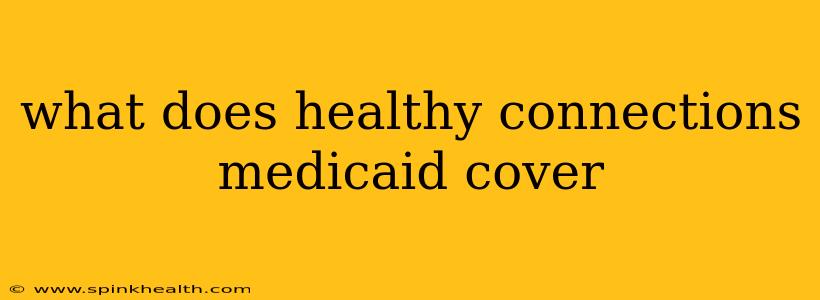What Does Healthy Connections Medicaid Cover? Navigating the Maze of Behavioral Health Services
Let's be honest, navigating the world of Medicaid coverage can feel like wandering through a maze. Understanding what's covered, especially when it comes to something as crucial as mental and behavioral health, can be particularly challenging. This is especially true for Healthy Connections, a Medicaid managed care plan offered in various states (specific coverage varies by state and plan). This post will unravel the mysteries of Healthy Connections Medicaid coverage for behavioral health services, answering your burning questions along the way.
My name is Sarah, and I've spent years working within the healthcare system, helping individuals understand their coverage options. This personal experience fuels my passion for making complex health information accessible to everyone.
What exactly is Healthy Connections?
Healthy Connections is not a single, nationwide program. Instead, it's a brand name used by various managed care organizations (MCOs) to provide Medicaid services in specific states. Think of it like a brand name for a car – different manufacturers might use similar names for different models. The specific services covered under the "Healthy Connections" banner depend entirely on the state and the specific MCO providing the coverage.
This means there's no one-size-fits-all answer to "What does Healthy Connections cover?" You must check your specific plan documents or contact your state's Medicaid office to get precise details on what your plan covers.
What types of behavioral health services are typically covered under Healthy Connections (or similar Medicaid plans)?
Most Medicaid plans, including those branded as Healthy Connections, aim to provide a comprehensive range of behavioral health services. This generally includes:
-
Therapy: This is a broad category encompassing individual, group, and family therapy sessions. The type of therapy offered often depends on the provider's expertise and the individual's specific needs. Common types include Cognitive Behavioral Therapy (CBT), Dialectical Behavior Therapy (DBT), and psychodynamic therapy.
-
Psychiatric Services: These services are typically provided by psychiatrists, medical doctors specializing in mental health. They might involve medication management, diagnostic assessments, and ongoing psychiatric care.
-
Medication: Many Medicaid plans cover prescription medications for mental health conditions, although specific medications and formularies (lists of approved drugs) vary.
-
Crisis Services: Access to crisis intervention services, including hotlines, emergency room visits for mental health emergencies, and short-term stabilization services, is generally a vital component of Medicaid coverage.
What about specific conditions? Does Healthy Connections cover [Specific Condition]?
This is where things get really specific. While Healthy Connections aims for broad coverage, the specific diagnoses covered and the extent of that coverage depend on individual state regulations and the particular plan's benefit package. For instance, coverage for conditions like:
- Depression: Usually covered, including therapy and medication.
- Anxiety: Generally covered, similar to depression.
- Substance Use Disorder: Often covered, including medication-assisted treatment (MAT) and counseling.
- Bipolar Disorder: Typically covered, requiring a combination of therapy and medication management.
- Schizophrenia: Covered, usually involving ongoing psychiatric care, medication, and rehabilitation services.
To find out the exact coverage for a specific condition under your Healthy Connections plan, you must contact your plan directly or refer to your member handbook. There's no single answer applicable to all Healthy Connections plans.
What are the limitations of Healthy Connections' behavioral health coverage?
Even with comprehensive plans, limitations exist. These may include:
- Network Restrictions: You might only be able to see providers within the Healthy Connections network.
- Prior Authorization: Some services might require prior authorization from your plan before you receive them.
- Limited Number of Sessions: Some plans might limit the number of therapy sessions you can receive annually.
- Specific Medication Coverage: The plan might not cover all medications, limiting your choices.
How can I find out the specifics of my Healthy Connections plan's behavioral health coverage?
The best approach is to:
- Check your member handbook: This document should outline all the covered services in detail.
- Contact your Healthy Connections plan directly: Their customer service department can answer your specific questions.
- Contact your state's Medicaid office: They can provide additional information about your coverage and options.
Navigating Medicaid can be a daunting task, but understanding your options and advocating for your needs is crucial. Remember, your health matters, and accessing the right services is key to well-being. Don't hesitate to reach out for help if you need it.

